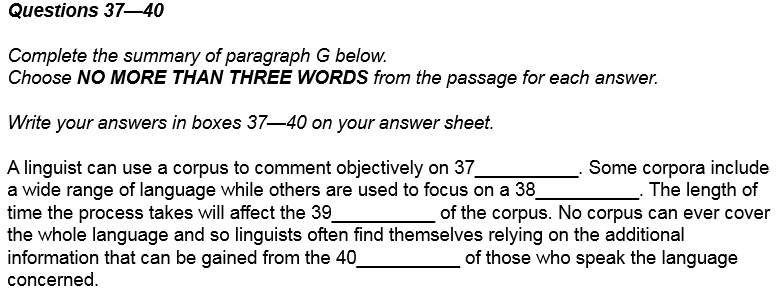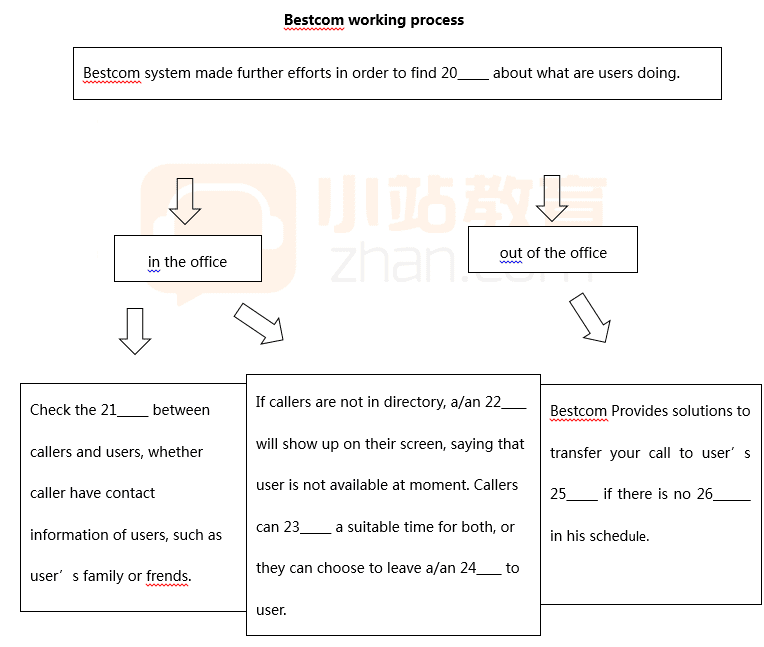怎样才能高效备考GRE阅读呢?今天小编给大家带来了GRE阅读的高分经验,希望能够帮助到大家,下面小编就和大家分享,来欣赏一下吧。
GRE阅读的高分经验
(一) 纵向看选项:
若有共同之处,拿公共元素回文章定位。If the essay doesn‘t have the common element, the choice is wrong.
(二)明确六种题型:
1、主题题型 2、态度题 3、类比题 4、细节题 5、逻辑题 6、结构题。
(三)根据定位排除答案
熟练运用各种基本方法定位之后选项与定位所在处无关的必错。
(四)选项是复合句的情况
如果选项是主从复合句,先处理主句,再处理从句。
(五) 如果选项含有明确的最高级、唯一性、比较级
则如果选项正确,原文就必定有其相对应的说法(但在否定句和疑问句中还要注意句子的意思)。
三、GRE阅读解题步骤:
第一步:题目的定位一定要发现题目的focus
若focus关系到全文,则如下步骤:
1、 用特征词定位特征词包括:时间、地点状语,定语。
2、 若无特征词,则找focus首次出现的地方。
关键:先找到focus所在的一段(only)。
第二步:进行答案的通用排除
在看一遍后即有2~3个选项可排除。
依靠:
1、 排除法:如排除不含关键词的选项,排除完全和主态度相反的选项等。
2、 做题的感觉。
第三步:答案的定位
而后将答案与文章中对应句作同义改写,选意思最相近的。
注:所以在平时练习时要注意找出处。
答案直选法:原文重现 同义修改 定状不变即找到对应的句子后,与答案一起分析句子结构,主、谓、宾、补均可以变,只有定、状这些限制时间发生唯一性的标志不能变。
GRE阅读材料练习:帮你解密年龄与智慧的关系
Americans get wiser with age. Japanese are wise from the start
美国人年龄越大越聪明。日本人从小就聪明
ONE stereotype of wisdom is a wizened Zen-master smiling benevolently at
the antics of his pupils, while referring to them as little grasshoppers or some
such affectation, safe in the knowledge that one day they, too, will have been
set on the path that leads to wizened masterhood.
提到智慧的时候,人们脑海里总会出现这样一个老套的画面:一个削瘦的禅宗大师面容慈祥的对他的弟子微笑着,一边叫他们小不点,心中十分确定他们迟早会走上这条通往智慧的禅宗之道。
But is it true that age brings wisdom?
但是智慧真的与年龄有关吗?
A study two years ago in North America, by Igor Grossmann of the University
of Waterloo, in Canada, suggested that it is.
两年前,加拿大滑铁卢大学Igor Grossmann博士的研究显示情况的确如此。
In as much as it is possible to quantify wisdom, Dr Grossmann found that
elderly Americans had more of it than youngsters.
由于智慧可以标准量化,他发现年长的美国人的确比年轻人要聪明。
He has, however, now extended his investigation to Asia—the land of the
wizened Zen-master—and, in particular, to Japan.
但是,如今他将调查扩展至整个亚洲—这个拥有禅宗大师的神奇土地—特别是日本。
There, he found, in contrast to the West, that the grasshoppers are their
masters' equals almost from the beginning.
在那里他发现,与西方相比,几乎从一开始,这些弟子与大师在智力方面难分伯仲 。
Dr Grossmann's study, just published in Psychological Science, recruited
186 Japanese from various walks of life and compared them with 225
Americans.
Grossmann博士研究结果刚发表在《心理科学》。他招募了186个来自各行各业的日本人并且与225个美国人做对比研究。
Participants were asked to read a series of pretend newspaper articles.
他要求参与者阅读一些假装在报纸上发表的文章。
Half des cribed conflict between groups, such as a debate between residents
of an impoverished Pacific island over whether to allow foreign oil companies to
operate there following the discovery of petroleum.
其中一半描述了一些团体斗争,比如太平洋小岛上当地居民关于是否允许外国石油公司开发刚发现的石油资源。
The other half took the form of advice columns that dealt with conflicts
between individuals: siblings, friends and spouses.
另一半文章以专栏的方式提供兄弟姐妹、朋友、配偶之间的个人斗争解决建议。
After reading each article, participants were asked What do you think will
happen after that? and Why do you think it will happen this way? Their responses
were recorded and transc ribed.
在阅读完文章之后,研究人员会问参与者两个问题,分别是此事发生后,你认为事态将会如何发展??和为什么你认为事态会这样发展?然后研究人员会记录他们的答案。
Dr Grossmann and his colleagues removed age-related information from the
transc ripts, and also any clues to participants' nationalities, and then passed
the edited versions to a group of assessors.
Grossmann博士和同事们会在记录中剔除与他们年龄和国籍相关的信息,然后将处理过的记录版本交给经过培训的一组评委,他们都对答案的有一致的评分标准。
These assessors were trained to rate trans cribed responses consistently,
and had been tested to show that their ratings were statistically comparable
with one another.
这些评估成员经过训练,能够始终以相同标准对纸上答案进行评分;并且已通过测试表明其评出的分数在统计方面相互具有可比性。
The assessors scored participants' responses on a scale of one to three.
This attempted to capture the degree to which they discussed what psychologists
consider five crucial aspects of wise reasoning: willingness to seek
opportunities to resolve conflict; willingness to search for compromise;
recognition of the limits of personal knowledge; awareness that more than one
perspective on a problem can exist; and appreciation of the fact that things may
get worse before they get better.
评委将参与者的答案按1至3分进行评分。他们想通过这种方法把握心理学家认为的五个有关于智慧方面的重要程度,分别是:寻求解决争端机会的意愿;寻求折中方法的意愿;对个人知识有限的认识度;对问题存在多个方面的意识程度;和对事情在往好的方向发展前的趋坏倾向的估计程度。
A score of one on any aspect indicated a participant gave no consideration
to it.
1分代表参与者根本就没有考虑过,
A score of two indicated some consideration.
2分代表参与者有了些思考但并不深入,
A score of three indicated a great deal of consideration.
3分代表参与者对这些问题有深入的思考。
Each participant's scores were then added up and mathematically transformed
to create an overall value within a range of zero to 100 for both interpersonal
and intergroup wisdom.
将参与者的每个问题的得分相加,再把总分从人际关系及团体关系两方面分别转换为百分制。
The upshot was that, as Dr Grossmann had found before, Americans do get
wiser with age.
与Grossmann博士以前的结果一样,美国人随着年龄的增长智慧增加。
Their intergroup wisdom score averaged 45 at the age of 25 and 55 at
75.
25岁的美国人社会群体的判断力平均数是45而75岁的美国人平均数是55。
Their interpersonal score similarly climbed from 46 to 50.
他们人际关系的判断力平均数同样随年龄由46攀升至50。
Japanese scores, by contrast, hardly varied with age.
但是与美国人的结果相反,日本人的分数与年龄并无太大关系。
Both 25-year-olds and 75-year-olds had an average intergroup wisdom of
51.
25岁和75岁的人的社会群体的判断力平均数都是51;
For interpersonal wisdom, it was 53 and 52.
对于人际关系判断力反而是25岁的是53,75岁的人是52.
Taken at face value, these results suggest Japanese learn wisdom faster
than Americans.
这些结果显示日本人比美国人更早变聪明一些。
One up, then, to the wizened Zen-masters. But they also suggest a
paradox.
年轻人以一分的优势险胜那些削瘦的禅宗大师们。但是却有一个悖论:
Generally, America is seen as an individualistic society, whereas Japan is
quite collectivist.
通常说来美国被视为是一个充满了个人主义的社会,然而日本则更推崇集体主义。
Yet Japanese have higher scores than Americans for the sort of
interpersonal wisdom you might think would be useful in an individualistic
society.
但是日本人在人际关系能力这一项上的得分却比美国人要高,而人际关系判断力是大多数人认为在个人主义社会中十分受用的能力。
Americans, by contrast—at least in the maturity of old age—have more
intergroup wisdom than the purportedly collectivist Japanese.
相反,美国人—至少在年龄比较高的那一组中—在群体判断力的得分上比据称崇尚集体主义的日本人要高。
Perhaps, then, you need individual skills when society is collective, and
social ones when it is individualistic.
也许,当社会推崇集体主义的时候你也需要人际关系技巧,在推崇个人主义的社会里你同样需要社交技巧。
All of which goes to show that the real root of wisdom is this: do not
assume, little grasshopper, that your prejudices are correct.
所有的这一切都表明,智慧的真正根源是:别事先假定你的成见是正确的,也别轻看了那些小不点。
2020GRE阅读的高分经验相关文章:
★ GRE写作:高分技巧
★ GRE备考保分提分经验谈
★ GRE写作:高分冲刺
★ GRE写作:怎样准备提纲
★ GRE备考如何参考学习高分经验
★ GRE语文高分考生漫谈verbal提分技巧经验
★ GRE考试如何应对术语类词汇
2020GRE阅读的高分经验
上一篇:GRE阅读中的同位语结构
下一篇:2020GRE阅读考试三招搞定






